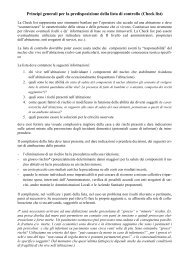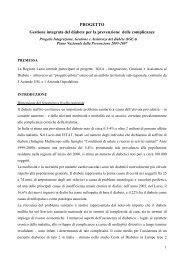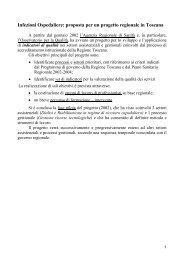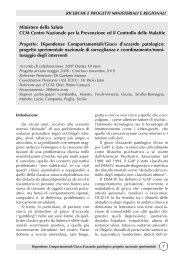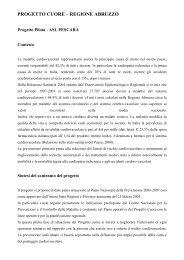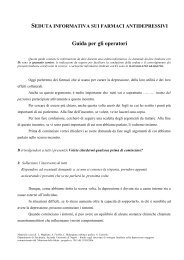Gaining health : analysis of policy development in European ...
Gaining health : analysis of policy development in European ...
Gaining health : analysis of policy development in European ...
Create successful ePaper yourself
Turn your PDF publications into a flip-book with our unique Google optimized e-Paper software.
Chapter 6<br />
Po<strong>in</strong>ters to the future<br />
Péter Makara & Anna Ritsatakis<br />
Introduction<br />
In the com<strong>in</strong>g years, the substantial reduction <strong>of</strong> NCD and<br />
their related <strong>health</strong> <strong>in</strong>equalities constitute one <strong>of</strong> the major<br />
public <strong>health</strong> challenges fac<strong>in</strong>g Europe. <strong>Ga<strong>in</strong><strong>in</strong>g</strong> <strong>health</strong> (1),<br />
WHO’s <strong>European</strong> NCD Strategy, outl<strong>in</strong>es a comprehensive,<br />
action-oriented approach to the prevention and control <strong>of</strong><br />
NCD.<br />
Those who plan and deliver policies and services to tackle<br />
NCD face <strong>in</strong>creas<strong>in</strong>g pressure to demonstrate that their<br />
actions are worthwhile, effective and efficient. They are<br />
faced with questions on: whether an NCD <strong>policy</strong> is a good<br />
<strong>in</strong>vestment; how the short- and long-term aims <strong>of</strong> such a<br />
<strong>policy</strong> can be harmonized; whether there are general rules<br />
<strong>of</strong> plann<strong>in</strong>g, coord<strong>in</strong>at<strong>in</strong>g, implement<strong>in</strong>g and monitor<strong>in</strong>g policies<br />
to tackle NCD; to what degree social and economic<br />
factors related to policies tackl<strong>in</strong>g NCD can be <strong>in</strong>fluenced;<br />
and how the result<strong>in</strong>g mutual ga<strong>in</strong>s can be measured. Policies<br />
and programmes to tackle NCD, if properly planned<br />
and implemented, <strong>in</strong>volve complex and sophisticated activities.<br />
NCD <strong>policy</strong> action requires multiple approaches, relies<br />
on <strong>in</strong>terdiscipl<strong>in</strong>ary <strong>in</strong>puts and operates at several levels<br />
over long periods <strong>of</strong> time. Despite this complexity, <strong>policy</strong><br />
<strong>development</strong> must be monitored, assessed and revised.<br />
Fortunately, over the last 2–3 decades, knowledge and<br />
understand<strong>in</strong>g about how best to develop policies to tackle<br />
NCD have significantly improved. Decision-makers and<br />
practitioners, however, are not always fully aware <strong>of</strong> these<br />
<strong>development</strong>s or their implications. This study was not <strong>in</strong>tended<br />
to provide a “cookery book” for NCD <strong>policy</strong>-mak<strong>in</strong>g.<br />
Nevertheless, some <strong>of</strong> the lessons learnt may <strong>of</strong>fer a<br />
source <strong>of</strong> <strong>in</strong>spiration and po<strong>in</strong>ters for future <strong>policy</strong>-mak<strong>in</strong>g.<br />
The extreme complexity <strong>of</strong> the task requires orig<strong>in</strong>ality and<br />
creativity, to build on exist<strong>in</strong>g experience while explor<strong>in</strong>g<br />
new ways and solutions. In look<strong>in</strong>g forward, <strong>policy</strong>-makers<br />
are faced with a wide range <strong>of</strong> issues, both long-stand<strong>in</strong>g<br />
such as the age<strong>in</strong>g population and newly emerg<strong>in</strong>g such as<br />
technological changes <strong>in</strong> <strong>health</strong> care and the communications<br />
field, globalization and an expand<strong>in</strong>g EU. In this f<strong>in</strong>al<br />
chapter, therefore, some <strong>of</strong> the challenges and opportunities<br />
<strong>in</strong> the <strong>policy</strong> environment are briefly touched on to<br />
give an idea <strong>of</strong> the comprehensiveness and complexity <strong>of</strong><br />
the task ahead. Some po<strong>in</strong>ters for the future are then suggested.<br />
Challenges and opportunities<br />
Demographic and <strong>health</strong> issues<br />
By 2050, on average <strong>in</strong> OECD countries, a quarter <strong>of</strong> the<br />
population will be aged 65 years and older (2). A new, older<br />
society is emerg<strong>in</strong>g, with implications for families, <strong>health</strong><br />
care, and social and economic <strong>development</strong>. In the WHO<br />
<strong>European</strong> Region, people aged 65 years can expect to live a<br />
further 17 years and, if present trends cont<strong>in</strong>ue, those aged<br />
65–79 years will be more active and <strong>in</strong> better <strong>health</strong> than<br />
<strong>in</strong> previous generations. They represent a valuable resource<br />
for society, so it is more important than ever that people<br />
rema<strong>in</strong> <strong>health</strong>y and <strong>in</strong>dependent.<br />
Chapter 6<br />
253<br />
Po<strong>in</strong>ters to the future



